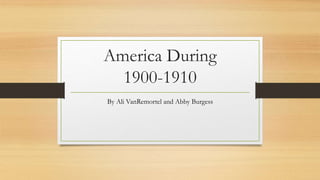
America 1900-1910: Presidents, Progressivism, and Reform
- 1. America During 1900-1910 By Ali VanRemortel and Abby Burgess
- 2. • William McKinley: 1897-1901 • Theodore Roosevelt: 1901- 1908 • William Howard Taft: 1908-1913 Presidents in 1900-1910
- 3. Theodore Roosevelt • Took office after McKinley was shot. • Young and robust • Experience in politics • Assistant Sec. of the Navy • Spanish American War Rough Rider • V.P for McKinley • Officially a Republican but held many Progressive views and acted on them. • Battling large businesses, believing in the “common man,” and confronting the struggle between management and labor.
- 4. The Election of 1094 • TR wins with his “Square Deal” • Control of corporation • “Trust Buster” filled suits against 44 trusts • Consumer protection • Conservation of natural resources • Set aside over 200 million acres for national forests, reserves, and for wildlife.
- 5. William Howard Taft • Hand picked by TR • Was less enthusiastic and more cautious • Reduced much of TR’s conservation efforts • Prosecuted more trusts than Roosevelt.
- 6. Leaders and Legislation • Elkins act 1903- RR couldn’t change rates without giving the public advanced notice. • Hepburn Act 1906- ICC set max. rates, uniform accounting method requirements, & declared no free passes for congressmen. • Meat Inspection Act and the Pure Food and Drug Act. • Payne-Aldrich Bill- lowered tariffs • Joe Cannon- Speaker of the House, supported old machine style politics.
- 7. The Progressive Movement • Improve the economy/government by making the government aware of the issues. • Muckrakers- journalists who pointed out problems with society hoping the make people uneasy. • Upton Sinclair, Ida Tarbell, Lincoln Steffens, Jacob Riis • The suffrage movement gained momentum.
- 8. Court Cases 1900-1910 • Northern Securities Co. V. United States 1903 • Ruled the Great Northern & Northern Pacific companies dissolve their monopoly, Northern Securities Co. • Swift & Co. V. United States 1905 • Government has a right to regulate monopolies if it has a direct effect on commerce. • Adair V. United States 1908 • Upheld “yellow- dog” contracts • Muller V. Oregon 1908 • Justified gender discrimination and usage of labor laws to restrict working hours for women to protect their health.
- 9. Authors and Literature • Newspaper Idols- Hearst and Pulitzer increased sales by including sports, scandals, and cartoon strips. • Susan B. Anthony- History of Woman Suffrage • Theodor Dreiser- Sister Carrie • W.E.B. Du Bois-The Souls of Black Folk • Lincoln Steffens- The Shame of the Cities • Ida Tarbell- The History of the Standard Oil Company • Upton Sinclair- The Jungle
- 10. Fashion Trends and Fads • Fashion was formal and romantic • Men wore slimming trousers • Women wore bobbed hair and large hats, skirts also began to shorten • Fads were ping pong and speeding
- 11. Influences of the Media • Radios brought music into the house.
- 12. Social Issues and Reform • Muckrakers cleaned up society such as the meat packing industry. • Some believed moral values began breaking down. • Women’s Rights was in the spotlight • Religious reform brought the YMCA and YWCA
- 13. Foreign Policy of the U.S. • Trans-Siberian Railroad- This railroad was completed and opened in () in Russia, and it opened up large scale access and shipping. • Panama Canal- The canal was built for shipping and war purposes. After a conflict with purchasing the land from Colombia, the United States backed up a Panamanian revolution against Colombia. The United States got the land for $10 million and construction began in 1904.
- 15. Continued • Roosevelt Corollary- Revision on Monroe Doctrine stated that the U.S. would only intervene in foreign countries if they collapsed or were damaging the U.S. economy. • Roosevelt Settles dispute in Asia- Russia and Japan were at war, and Roosevelt came up with a treaty to satisfy them both. He succeeded in keeping open trade in China.
- 16. Economics • Progressives-favored the government regulation of business to ensure competition and free enterprise • Muckrakers- journalists who encouraged readers to demand more regulation of business • The Jungle- Upton Sinclair showed America the horrors of the Chicago Union Stock Yards
- 18. Continued • December 15, 1907 Great White Fleet- Roosevelt sent Navy on a tour around the world to show U.S. Superiority
- 20. Continued • Boxer Rebellion- Chinese organization killed foreigners and Chinese Christians. U.S. troops were sent into stop the uprising. • Open Door Policy- Allowed multiple imperial powers access to China • Hay-Pauncefote Treaty- Between the U.S. and Britain about the creation of the Panama Canal
- 22. Continued • Gentlemen's Agreement of 1907- U.S. would not impose restrictions on Japanese immigration, but Japan would stop emigration to the U.S. • 1908 Root Takahira Agreement- Recognized the territory of China • 1909 Taft Introduced Dollar Diplomacy- control Latin America and East Asia through its economic power by guaranteeing loans made to foreign countries.
- 23. Other • The Industrial Age was in full swing • Sears Roebuck and Montgomery Ward were both very popular stores • Safety in food processing and the environment became issues • Wright Brothers made their first flight
- 25. Other • Cadilac was founded and Henry Ford provided the first affordable car ($700- $900) • The Sunday Drive became a national pastime
- 27. Thank You!
